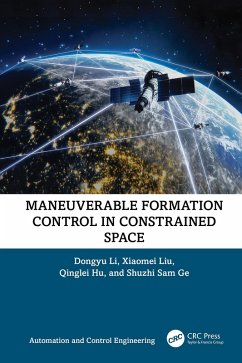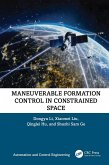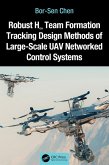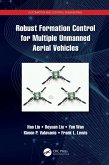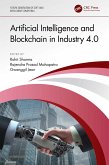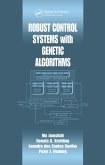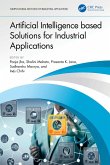Dongyu Li, Xiaomei Liu, Qinglei Hu, Shuzhi Ge
Maneuverable Formation Control in Constrained Space (eBook, ePUB)
173,95 €
173,95 €
inkl. MwSt.
Sofort per Download lieferbar

87 °P sammeln
173,95 €
Als Download kaufen

173,95 €
inkl. MwSt.
Sofort per Download lieferbar

87 °P sammeln
Jetzt verschenken
Alle Infos zum eBook verschenken
173,95 €
inkl. MwSt.
Sofort per Download lieferbar
Alle Infos zum eBook verschenken

87 °P sammeln
Dongyu Li, Xiaomei Liu, Qinglei Hu, Shuzhi Ge
Maneuverable Formation Control in Constrained Space (eBook, ePUB)
- Format: ePub
- Merkliste
- Auf die Merkliste
- Bewerten Bewerten
- Teilen
- Produkt teilen
- Produkterinnerung
- Produkterinnerung

Bitte loggen Sie sich zunächst in Ihr Kundenkonto ein oder registrieren Sie sich bei
bücher.de, um das eBook-Abo tolino select nutzen zu können.
Hier können Sie sich einloggen
Hier können Sie sich einloggen
Sie sind bereits eingeloggt. Klicken Sie auf 2. tolino select Abo, um fortzufahren.

Bitte loggen Sie sich zunächst in Ihr Kundenkonto ein oder registrieren Sie sich bei bücher.de, um das eBook-Abo tolino select nutzen zu können.
Inspired by the community behaviors of animals and humans, cooperative control has been intensively studied by numerous researchers in recent years, which aims to build a network system collectively driven by a global objective function.
- Geräte: eReader
- mit Kopierschutz
- eBook Hilfe
Andere Kunden interessierten sich auch für
![Maneuverable Formation Control in Constrained Space (eBook, PDF) Maneuverable Formation Control in Constrained Space (eBook, PDF)]() Dongyu LiManeuverable Formation Control in Constrained Space (eBook, PDF)173,95 €
Dongyu LiManeuverable Formation Control in Constrained Space (eBook, PDF)173,95 €![Robust H8 Team Formation Tracking Design Methods of Large-Scale UAV Networked Control Systems (eBook, ePUB) Robust H8 Team Formation Tracking Design Methods of Large-Scale UAV Networked Control Systems (eBook, ePUB)]() Bor-Sen ChenRobust H8 Team Formation Tracking Design Methods of Large-Scale UAV Networked Control Systems (eBook, ePUB)54,95 €
Bor-Sen ChenRobust H8 Team Formation Tracking Design Methods of Large-Scale UAV Networked Control Systems (eBook, ePUB)54,95 €![Robust Formation Control for Multiple Unmanned Aerial Vehicles (eBook, ePUB) Robust Formation Control for Multiple Unmanned Aerial Vehicles (eBook, ePUB)]() Hao LiuRobust Formation Control for Multiple Unmanned Aerial Vehicles (eBook, ePUB)48,95 €
Hao LiuRobust Formation Control for Multiple Unmanned Aerial Vehicles (eBook, ePUB)48,95 €![Artificial Intelligence and Blockchain in Industry 4.0 (eBook, ePUB) Artificial Intelligence and Blockchain in Industry 4.0 (eBook, ePUB)]() Artificial Intelligence and Blockchain in Industry 4.0 (eBook, ePUB)52,95 €
Artificial Intelligence and Blockchain in Industry 4.0 (eBook, ePUB)52,95 €![Robust Control Systems with Genetic Algorithms (eBook, ePUB) Robust Control Systems with Genetic Algorithms (eBook, ePUB)]() Mo JamshidiRobust Control Systems with Genetic Algorithms (eBook, ePUB)68,95 €
Mo JamshidiRobust Control Systems with Genetic Algorithms (eBook, ePUB)68,95 €![Artificial Intelligence based Solutions for Industrial Applications (eBook, ePUB) Artificial Intelligence based Solutions for Industrial Applications (eBook, ePUB)]() Artificial Intelligence based Solutions for Industrial Applications (eBook, ePUB)52,95 €
Artificial Intelligence based Solutions for Industrial Applications (eBook, ePUB)52,95 €![Computer-Aided Control Systems Design (eBook, ePUB) Computer-Aided Control Systems Design (eBook, ePUB)]() Cheng Siong ChinComputer-Aided Control Systems Design (eBook, ePUB)88,95 €
Cheng Siong ChinComputer-Aided Control Systems Design (eBook, ePUB)88,95 €-
-
-
Inspired by the community behaviors of animals and humans, cooperative control has been intensively studied by numerous researchers in recent years, which aims to build a network system collectively driven by a global objective function.
Dieser Download kann aus rechtlichen Gründen nur mit Rechnungsadresse in A, B, BG, CY, CZ, D, DK, EW, E, FIN, F, GR, HR, H, IRL, I, LT, L, LR, M, NL, PL, P, R, S, SLO, SK ausgeliefert werden.
Produktdetails
- Produktdetails
- Verlag: Taylor & Francis eBooks
- Seitenzahl: 416
- Erscheinungstermin: 14. Mai 2024
- Englisch
- ISBN-13: 9781040015490
- Artikelnr.: 70558801
- Verlag: Taylor & Francis eBooks
- Seitenzahl: 416
- Erscheinungstermin: 14. Mai 2024
- Englisch
- ISBN-13: 9781040015490
- Artikelnr.: 70558801
- Herstellerkennzeichnung Die Herstellerinformationen sind derzeit nicht verfügbar.
Dongyu Li received the B.S. and Ph.D. degree from Control Science and Engineering, Harbin Institute of Technology, China, in 2016 and 2020. He was a joint Ph.D. student with the Department of Electrical and Computer Engineering, National University of Singapore from 2017 to2019, and a research fellow with the Department of Biomedical Engineering, National University of Singapore, from 2019 to 2021. He is currently an Associate Professor with the School of Cyber Science and Technology, Beihang University, China. His research interests include networked system cooperation, adaptive systems, and robotic control.
Xiaomei Liu received the B.Sc. degree in automation from Xi'an Jiaotong University, Xi'an, China, in 2013, and the Ph.D. degree from National University of Singapore, Singapore, in 2017. Her current research interests include cooperative control of multiagent systems, social robotics, deep learning, and computer vision.
Qinglei Hu received the B.Eng. degree in electrical and electronic engineering from Zhengzhou University, Zhengzhou, China, in 2001, and the Ph.D. degree, with the specialization in guidance and control, in control science and engineering from the Harbin Institute of Technology, Harbin, China, in 2006. From 2003 to 2014, he was with the Department of Control Science and Engineering, Harbin Institute of Technology, and then he joined Beihang University, Beijing, China, in 2014, as a Full Professor. His current research interests include variable structure control and applications, and fault-tolerant control and applications.
Shuzhi Sam Ge received the B.Sc. degree from Beihang University, Beijing, China, in 1986 and the Ph.D. degree from the Imperial College London, London, U.K., in 1993. He is the Director of the Social Robotics Laboratory of Interactive Digital Media Institute, Singapore, and the Centre for Robotics, Chengdu, China, and a Professor with the Department of Electrical and Computer Engineering, National University of Singapore, Singapore, on leave from the School of Computer Science and Engineering, University of Electronic Science and Technology of China, Chengdu. He has co-authored four books and over 300 international journal and conference papers. His current research interests include social robotics, adaptive control, intelligent systems, and artificial intelligence. Dr. Ge is the Editor-in-Chief of the International Journal of Social Robotics (Springer). He has served/been serving as an Associate Editor for a number of flagship journals, including IEEE Transactions on Automation Control, IEEE Transactions on Control Systems Technology, IEEE Transactions on Neural Networks, and Automatica. He serves as a Book Editor for the Taylor and Francis Automation and Control Engineering Series. He served as the Vice President for Technical Activities from 2009 to 2010 and Membership Activities from 2011 to 2012, and a member of the Board of Governors from 2007 to 2009 at the IEEE Control Systems Society. He is a fellow of the International Federation of Automatic Control, the Institution of Engineering and Technology, and the Society of Automotive Engineering.
Xiaomei Liu received the B.Sc. degree in automation from Xi'an Jiaotong University, Xi'an, China, in 2013, and the Ph.D. degree from National University of Singapore, Singapore, in 2017. Her current research interests include cooperative control of multiagent systems, social robotics, deep learning, and computer vision.
Qinglei Hu received the B.Eng. degree in electrical and electronic engineering from Zhengzhou University, Zhengzhou, China, in 2001, and the Ph.D. degree, with the specialization in guidance and control, in control science and engineering from the Harbin Institute of Technology, Harbin, China, in 2006. From 2003 to 2014, he was with the Department of Control Science and Engineering, Harbin Institute of Technology, and then he joined Beihang University, Beijing, China, in 2014, as a Full Professor. His current research interests include variable structure control and applications, and fault-tolerant control and applications.
Shuzhi Sam Ge received the B.Sc. degree from Beihang University, Beijing, China, in 1986 and the Ph.D. degree from the Imperial College London, London, U.K., in 1993. He is the Director of the Social Robotics Laboratory of Interactive Digital Media Institute, Singapore, and the Centre for Robotics, Chengdu, China, and a Professor with the Department of Electrical and Computer Engineering, National University of Singapore, Singapore, on leave from the School of Computer Science and Engineering, University of Electronic Science and Technology of China, Chengdu. He has co-authored four books and over 300 international journal and conference papers. His current research interests include social robotics, adaptive control, intelligent systems, and artificial intelligence. Dr. Ge is the Editor-in-Chief of the International Journal of Social Robotics (Springer). He has served/been serving as an Associate Editor for a number of flagship journals, including IEEE Transactions on Automation Control, IEEE Transactions on Control Systems Technology, IEEE Transactions on Neural Networks, and Automatica. He serves as a Book Editor for the Taylor and Francis Automation and Control Engineering Series. He served as the Vice President for Technical Activities from 2009 to 2010 and Membership Activities from 2011 to 2012, and a member of the Board of Governors from 2007 to 2009 at the IEEE Control Systems Society. He is a fellow of the International Federation of Automatic Control, the Institution of Engineering and Technology, and the Society of Automotive Engineering.
1. Introduction
Part I Layered Affine Formation Control
2. Multi-Layer Formation Control of Multi-Agent Systems
3. Layered Affine Formation Control of Networked Uncertain Systems: a Fully
Distributed Framework over Directed Graphs
4. Cooperative Affine Circumnavigation of Networked Microsatellites
5. Fully Distributed Cooperative Affine Circumnavigation of Networked
Unmanned Aerial Vehicles
Part II Formation Control in Constrained Space
6. Formation Potential Field for Trajectory Tracking Control of Multi-Agent
Systems in Constrained Space
7. Neural-Network-Based Switching Formation Tracking Control of Multi-Agent
Systems with Uncertainties in Constrained Space
8. Event-Triggered Coordination for Formation Tracking Control in
Constrained Space with Limited Communication
9. Vision-Based Leader-Follower Formation Control of Multi-Agent Systems
with Visibility Constraints
10. Conclusion
Part I Layered Affine Formation Control
2. Multi-Layer Formation Control of Multi-Agent Systems
3. Layered Affine Formation Control of Networked Uncertain Systems: a Fully
Distributed Framework over Directed Graphs
4. Cooperative Affine Circumnavigation of Networked Microsatellites
5. Fully Distributed Cooperative Affine Circumnavigation of Networked
Unmanned Aerial Vehicles
Part II Formation Control in Constrained Space
6. Formation Potential Field for Trajectory Tracking Control of Multi-Agent
Systems in Constrained Space
7. Neural-Network-Based Switching Formation Tracking Control of Multi-Agent
Systems with Uncertainties in Constrained Space
8. Event-Triggered Coordination for Formation Tracking Control in
Constrained Space with Limited Communication
9. Vision-Based Leader-Follower Formation Control of Multi-Agent Systems
with Visibility Constraints
10. Conclusion
1. Introduction
Part I Layered Affine Formation Control
2. Multi-Layer Formation Control of Multi-Agent Systems
3. Layered Affine Formation Control of Networked Uncertain Systems: a Fully
Distributed Framework over Directed Graphs
4. Cooperative Affine Circumnavigation of Networked Microsatellites
5. Fully Distributed Cooperative Affine Circumnavigation of Networked
Unmanned Aerial Vehicles
Part II Formation Control in Constrained Space
6. Formation Potential Field for Trajectory Tracking Control of Multi-Agent
Systems in Constrained Space
7. Neural-Network-Based Switching Formation Tracking Control of Multi-Agent
Systems with Uncertainties in Constrained Space
8. Event-Triggered Coordination for Formation Tracking Control in
Constrained Space with Limited Communication
9. Vision-Based Leader-Follower Formation Control of Multi-Agent Systems
with Visibility Constraints
10. Conclusion
Part I Layered Affine Formation Control
2. Multi-Layer Formation Control of Multi-Agent Systems
3. Layered Affine Formation Control of Networked Uncertain Systems: a Fully
Distributed Framework over Directed Graphs
4. Cooperative Affine Circumnavigation of Networked Microsatellites
5. Fully Distributed Cooperative Affine Circumnavigation of Networked
Unmanned Aerial Vehicles
Part II Formation Control in Constrained Space
6. Formation Potential Field for Trajectory Tracking Control of Multi-Agent
Systems in Constrained Space
7. Neural-Network-Based Switching Formation Tracking Control of Multi-Agent
Systems with Uncertainties in Constrained Space
8. Event-Triggered Coordination for Formation Tracking Control in
Constrained Space with Limited Communication
9. Vision-Based Leader-Follower Formation Control of Multi-Agent Systems
with Visibility Constraints
10. Conclusion
